Navigating the Nigerian Business Landscape from The Diaspora

by Counseal Team
Updated January 27, 2025

For diaspora entrepreneurs eyeing Africa’s largest economy, Nigeria presents a landscape rich with opportunities and unique challenges. This comprehensive guide will help you navigate the complexities of establishing and growing a successful business in Nigeria while operating from abroad.
Understanding Nigeria’s Economic Landscape
Nigeria stands as Africa’s largest economy, with a GDP of $477 billion and a population exceeding 200 million. This massive market, combined with rapid digital transformation, creates unique opportunities for diaspora entrepreneurs.
Current Market Dynamics
The Nigerian market has evolved significantly, with several key indicators highlighting its potential:
- Technology sector contribution: 14.7% of GDP (2022)
- Mobile internet users: Projected 144 million by 2025
- E-commerce growth: 63% year-over-year increase
- Digital banking adoption: 63% among urban population
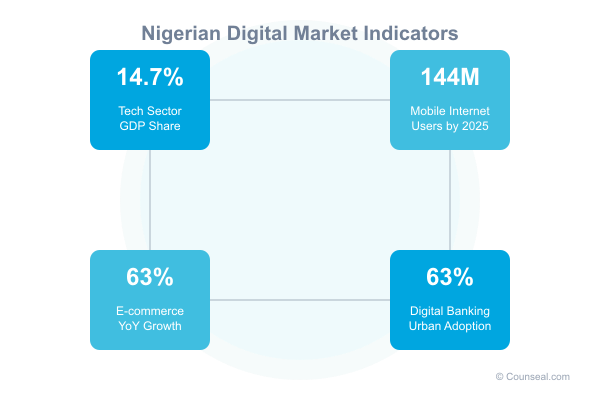
High-Growth Sectors
Technology and Digital Services
- Fintech: $834 million in investments (2021)
- E-commerce: $16.5 billion market value
- Digital Solutions: 47% annual growth rate
The tech sector, often called “the new oil,” has seen exponential growth, particularly in:
- Payment solutions
- E-commerce platforms
- Digital banking services
- Enterprise software
Agriculture and Agribusiness
With $85 billion market size and 12% annual growth, agriculture presents significant opportunities in:
- Modern farming techniques
- Food processing
- Storage solutions
- Export operations
Renewable Energy
The sector offers $9.2 billion in investment opportunities by 2025, focusing on:
- Solar power solutions
- Clean energy infrastructure
- Energy storage systems
- Green technology innovation
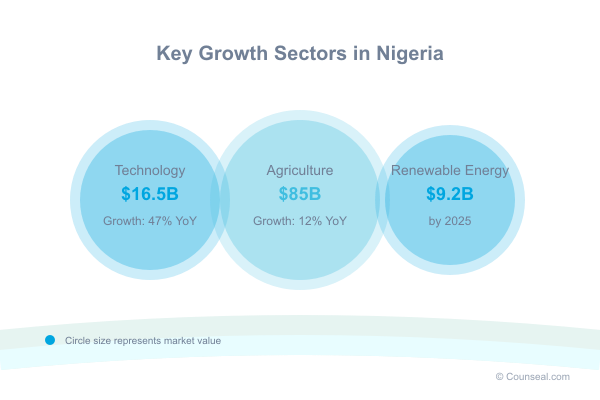
Regulatory Framework and Compliance
Essential Requirements
1. Business Registration
Through the Corporate Affairs Commission (CAC):
- Processing time: 7–14 days
- Required documents:
- Identification documents
- Proof of address
- Share capital documentation
- Directors’ information
- Registration fees vary by business type
2. Tax Compliance
Managed by the Federal Inland Revenue Service (FIRS):
- Company Income Tax: 30%
- Value Added Tax: 7.5%
- Available incentives:
- Pioneer status benefits
- Export incentives
- Zone-specific advantages
3. Sector-Specific Licenses
Requirements vary by industry:
- Banking and Finance: Central Bank approval
- Technology: NCC licensing
- Import/Export: NEPC registration
Practical Compliance Strategy
- Engage local legal expertise
- Maintain proper documentation
- Regular compliance audits
- Stay updated on regulatory changes
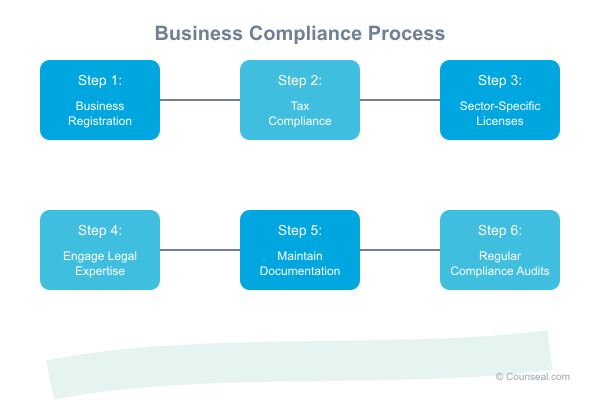
Market Entry Strategies
Digital Presence Establishment
1. E-commerce Integration
- Major platforms:
- Jumia: 40 million active users
- Konga: 8 million active users
- Local marketplaces
2. Social Media Engagement
Platform-specific strategies for:
- Instagram: 30 million users
- Facebook: 45 million users
- LinkedIn: 7 million professionals
Local Partnership Development
1. Strategic Alliances
- Joint ventures with local businesses
- Distribution partnerships
- Technology collaboration
- Research and development
2. Professional Services
- Legal representation
- Accounting services
- Market research firms
- Business consultants
Funding and Financial Management
Available Funding Options
1. Traditional Finance
- Commercial bank loans
- Development bank funding
- Government grants
- Export financing
2. Alternative Funding
- Angel investors
- Venture capital
- Crowdfunding platforms
- Diaspora investment networks
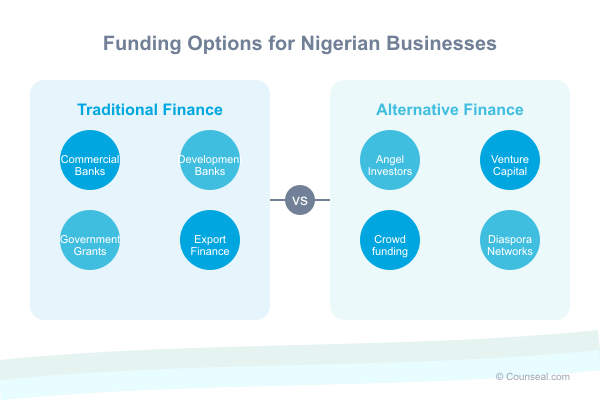
Financial Management Best Practices
- Multiple banking relationships
- Forex risk management
- Working capital optimization
- Investment planning
Technology Integration
Digital Transformation Tools
1. Business Operations
- Enterprise Resource Planning (ERP)
- Customer Relationship Management (CRM)
- Supply Chain Management
- Digital Payment Systems
2. Marketing Technology
- Social media management
- Email marketing
- Analytics tools
- Content management
Cybersecurity and Data Protection
- Data protection compliance
- Secure payment gateways
- Customer data management
- Fraud prevention systems
Cultural Intelligence and Business Etiquette
Understanding Local Business Culture
- Relationship-building importance
- Hierarchy and respect
- Time management expectations
- Communication styles
Regional Considerations
- Lagos: Fast-paced, tech-savvy
- Abuja: Government relations focus
- Port Harcourt: Energy sector hub
- Kano: Trading traditions
Network Building
Professional Associations
- Nigerian-Diaspora Chamber of Commerce
- Professional bodies by sector
- Alumni networks
- Industry associations
Digital Networking Platforms
- LinkedIn groups
- Professional forums
- Virtual events
- Industry webinars
Practical Steps for Getting Started
1. Market Research (1–2 months)
- Industry analysis
- Competitor research
- Market size assessment
- Consumer behavior study
2. Business Planning (2–3 months)
- Strategy development
- Financial modeling
- Risk assessment
- Operating structure
3. Legal Setup (1–2 months)
- Business registration
- Permits and licenses
- Compliance framework
- Legal documentation
4. Market Entry (3–4 months)
- Partnership development
- Team building
- Infrastructure setup
- Marketing launch
Resources and Support
Visit counseal.com/start for:
Legal Resources
- Document templates
- Compliance guides
- Regulatory updates
- Legal consultations
Business Support
- Market entry guides
- Professional network access
- Expert consultation
- Training resources
Technology Solutions
- Digital transformation tools
- Security protocols
- Payment solutions
- Operations management
Conclusion
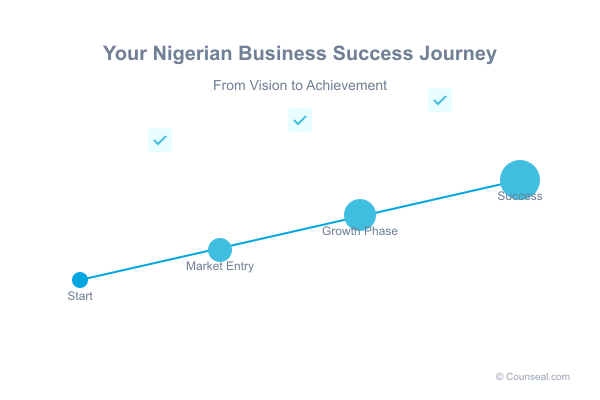
Success in the Nigerian market requires a balanced approach combining local understanding with international best practices. While challenges exist, the potential rewards are substantial for well-prepared diaspora entrepreneurs.Take the first step towards your Nigerian business success. Visit counseal.com/start for personalized guidance and support in your entrepreneurial journey.





